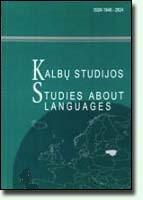E-mail Projects in the EFL Classroom – with Special Focus on Students’ Intercultural Learning. A Hungarian Perspective
E-mail Projects in the EFL Classroom – with Special Focus on Students’ Intercultural Learning. A Hungarian Perspective
Author(s): Helga DornerSubject(s): Language and Literature Studies
Published by: Kauno Technologijos Universitetas
Keywords: intercultural learning processes; communication; intercultural competence
Summary/Abstract: In intercultural learning processes language and culture are considered to be interdependent which means that by transmitting a reflective approach learners are likely to understand their own cultural background and see the limitations of the target language and its culture. To what extent students adapt to acting interculturally depends largely on the activities they are involved in during EFL lessons. Taking part in international e-mail projects – a combination of task-based teaching using project work and the technology-mediated model of learning – opens up new perspectives for asynchronous communication between learners of two partner-classes having different mother tongues but learning the same target language. Communicating in English via e-mail enables EFL students to learn interculturally, since they collect first-hand experience about different cultures and exchange ideas with learners all around the Globe. Our small-scale experiment aims at investigating whether the integration of intercultural e-mail projects in the EFL classroom can facilitate the participating students’ intercultural learning processes and their self-perceived development of intercultural communicative competence. We carried out three different international e-mail projects in three Hungarian grammar schools. As for the data analysis we included both quantitative and qualitative methods. We used the method of ‘triangulation’ i.e. focused on three perspectives (student, teacher, observer) and analysed the students’ e-mails on the basis of Byram’s (1997) model of intercultural communicative competence which deals with categories such as skills, attitudes, knowledge and critical awareness that are all identifiable in written language performance.
Journal: Kalbų Studijos
- Issue Year: 2006
- Issue No: 9
- Page Range: 64-70
- Page Count: 3

